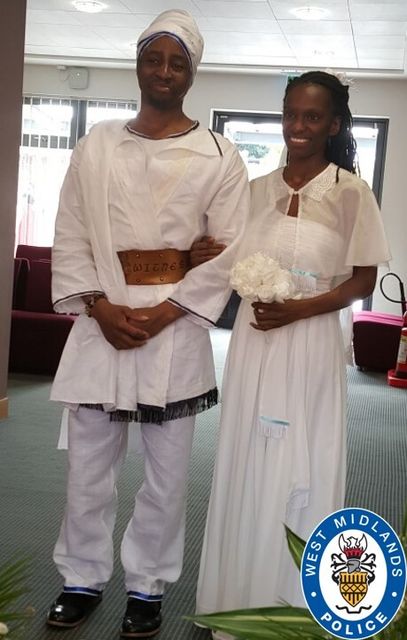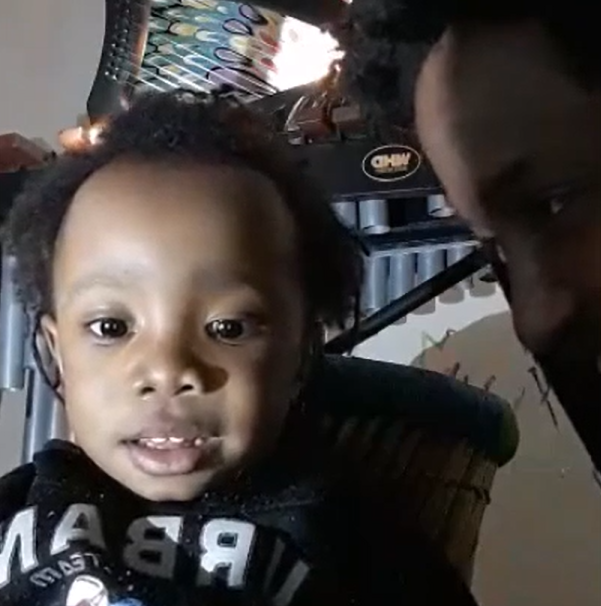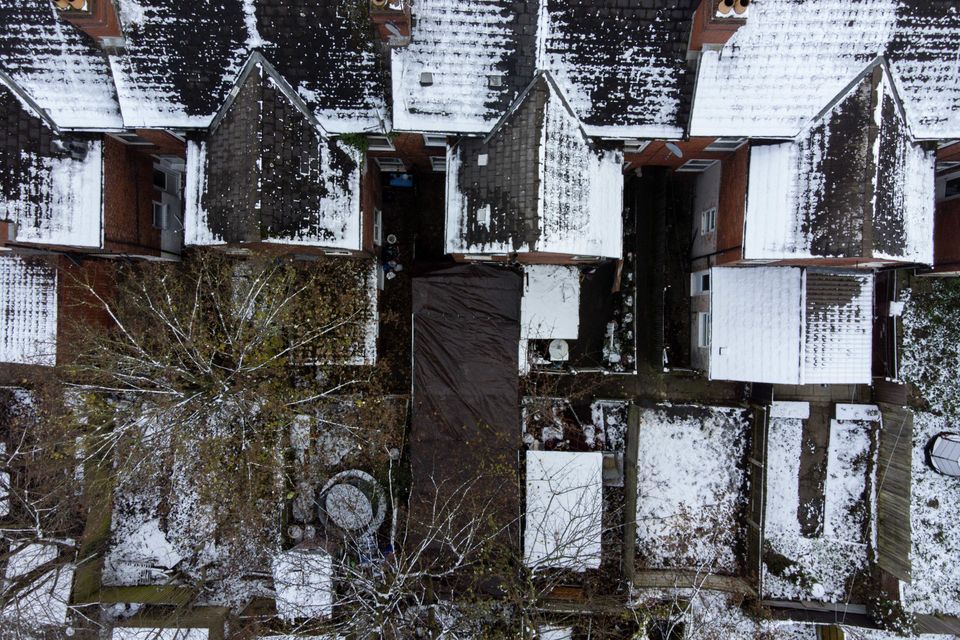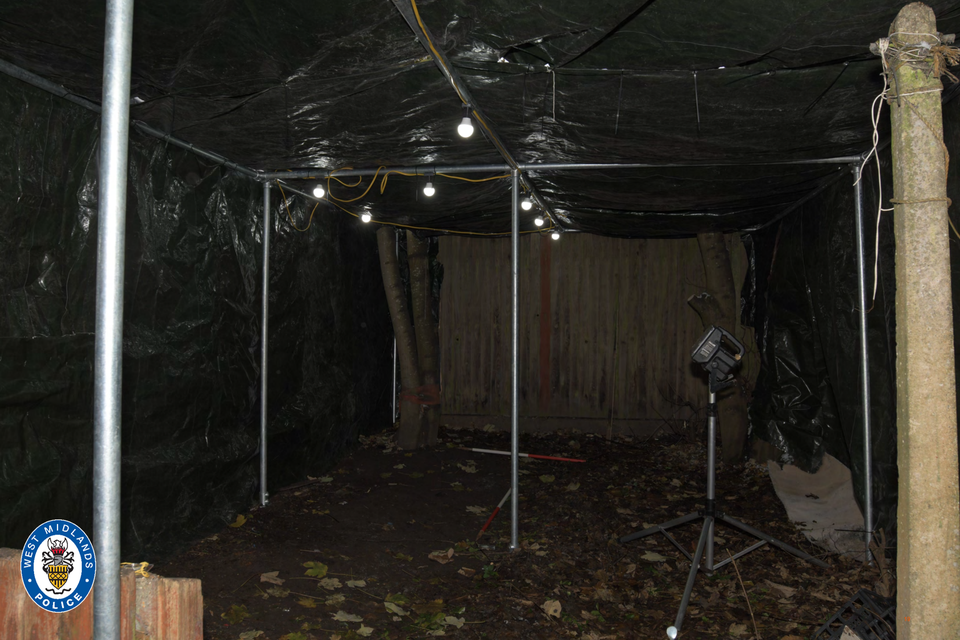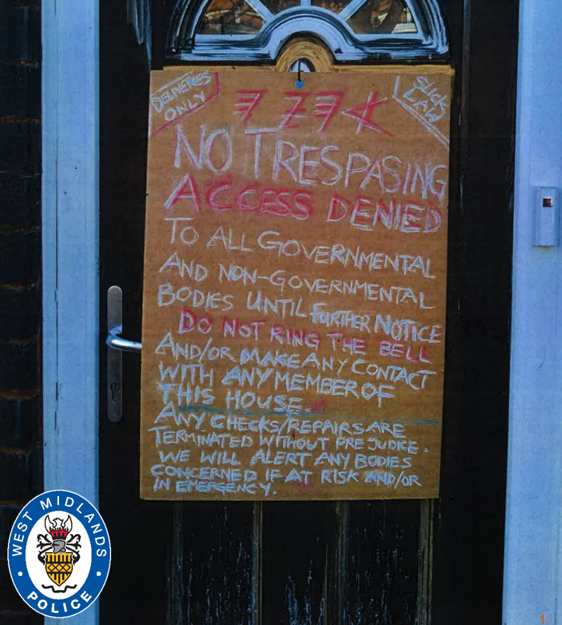Footage released after Tai and Naiyahmi Yasharahyalah were found guilty of causing or allowing Abiyah Yasharahyalah’s death showed the couple arguing with police inside the property, while their son’s body lay buried in the back garden.
A film of the pair being defiant and aggressive towards police at their caravan in Somerset, almost three years after Abiyah’s death and makeshift funeral, was also issued by West Midlands Police following guilty verdicts at Coventry Crown Court.
The couple, who left their son’s remains behind when they were evicted from a house in Clarence Road, Handsworth, Birmingham, in March 2022, were found guilty of further charges of perverting the course of justice and child cruelty.
Tai and Naiyahmi Yasharahyalah pictured on their wedding day (West Midlands Police/PA)
A two-month trial was told that Abiyah, aged three, died after a respiratory illness in January 2020, at a time when he was suffering from bone fractures, severe malnutrition, rickets, anaemia, stunted growth and severe dental decay.
Among police bodycam videos shown to the trial jury was one filmed by an officer during a welfare check at Clarence Road on September 2, 2021, during which London-born Tai accused police of “trespassing” in his self-professed “Kingdom of Yasharahyalah”.
After being informed that officers were there to check on concerns for people living at the property, Tai told police that his son’s whereabouts were none of the officers’ business.
Asked if any children were living at he address, Tai, who had buried his son’s body around 19 months previously, responded: “We have the right to remain silent. I am a citizen of Yasharahyalah – you have no jurisdiction in my realm.”
Tai was eventually arrested for obstructing police, but a mix-up related to a records relating to the address meant an inquiry into Abiyah’s whereabouts was not launched.
During the couple’s subsequent removal from a caravan they were living in in Somerset, Tai was also aggressive after complaining of a bad back.
Footage from the caravan, which police attended due to welfare concerns about the severely ill couple, shows Naiyahmi telling a policewoman “I do not require your services” and asking the officer to leave.
Abiyah, seen with his father in a family video (West Midlands Police/PA)
Tai was also recorded as he sat in the back of a police van, complaining that he was a “disabled person that can hardly move” and that he wished police had Tasered him in the face.
The trial heard that five days after the couple were helped out of the caravan, it emerged from a social media video spotted by a social worker that Tai appeared to have a son who he referred to in the footage as Abiyah.
Naiyahmi, who was born in Birmingham, was confronted about the clip and said “oh shit” and then “disengaged completely, refusing to provide any information”.
But Tai subsequently admitted Abiyah was dead, his death had not been registered “because it was not part of their culture” and they had held a private ceremony and buried him in the garden at Clarence Road.
Following the disclosure, both defendants were arrested on suspicion of neglect leading to the death of a child.
Commenting after the couple were convicted, the senior investigating officer for the inquiry, West Midlands Police Detective Inspector Joe Davenport, said: “When officers started to investigate Tai and Naiyahmi Yasharahyalah, they then realised that there was a child missing called Abiyah.
“When they asked around where Abiyah was, they initially denied the authorities any kind of information as to where he was, but eventually admitted that he had died in 2020 when they were living in Birmingham, and they had buried him in the back garden of their address in Clarence Road.”
The couple’s back garden covered by plastic sheeting in December 2022 (Jacob King/PA)
An incredibly detailed investigation then took place, the senior officer said, with the first step being to exhume Abiyah’s body.
“Because he’d been there for over two years there was very few remains left,” Mr Davenport said. “It was basically skeletonised remains, which meant that it wasn’t possible under a forensic post-mortem to establish a cause of death.
“So we had to call in different experts and different pathologists who could provide us with information to understand what Abiyah’s life would have been like and how he would have been at the point of his death.
“What they were able to tell me was that at the point of his death, he was incredibly small for his age. He was extremely malnourished and his bones were incredibly weak, to the point that he had six bone fractures at different points across his body, and those fractures would have occurred about six weeks before his death.
“In addition to that, he had incredibly poor oral health, and his teeth would have had abscesses. The picture that was painted was a child who was extremely neglected and in very poor condition at the point of his death, and his life would have been miserable to exist in, and he would have been in a significant amount of pain.”
The senior officer added that the couple’s claim that Abiyah died after contracting Covid-19 had been refuted by a respiratory expert.
The garden where police found Abiyah’s grave (West Midlands Police/PA)
“What we’ve been able to prove through the forensic evidence is that he did die as a result of malnutrition and medical neglect,” the senior detective said.
“They state that when they went to bed with him on the night that he died, he was having breathing problems, and then the next day, they woke up to find him dead.
“At that point, they took no action to call an ambulance or to try and get him any kind of medical care, and instead took it upon themselves to pronounce him dead, and then buried him in the back garden eight days later.”
On September 2, 2021, the officer said, Tai had offered no information as to where Abiyah was and confusion around records related to the address led to a “missed opportunity” to identify that Abiyah had died.
It is understood Abiyah did have an NHS number but his parents very quickly withdrew him from any kind of medical care, never took him to nursery, and no family or friends were allowed into his life.
A number of videos recovered as part of the inquiry, thought to have been filmed during a period at least four months before Abiyah’s death, show him smiling with both his parents.
A sign placed on the door of the Clarence Road home (West Midlands Police/PA)
In one clip, he apparently videoed himself with his mother in the background, while another clip shows Tai talking to his son, who smiles and laughs as music is played.
Det Insp Davenport said the couple’s belief system involved living “off the grid” with no kind of external support from the state.
“They lived a completely isolated life,” he said. “They didn’t allow anyone into their home in any way, and didn’t accept any kind of help.
“That made it extremely difficult for opportunities to arise where people would get to see Abiyah or to have any kind of interaction with him.
“They also frustrated this by whenever they were asked around where he was, whether that be by a professional or by a neighbour, they would act extremely aggressively and be very evasive around where he was.
“Ultimately moving locations around the country also frustrated that and prevented Abiyah’s death from being noticed.”
